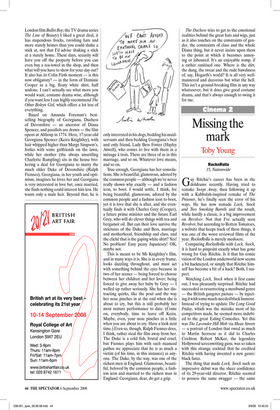Missing the mark
Toby Young
RocknRolla 15, Nationwide
Guy Ritchie’s career has been in the doldrums recently. Having tried to remake Swept Away, then following it up with a Kabbalah-inspired remake of The Prisoner, he’s finally seen the error of his ways. He has now remade Lock, Stock and Two Smoking Barrels and the result, while hardly a classic, is a big improvement on Revolver. Not that I’ve actually seen Revolver, but according to Rotten Tomatoes, a website that keeps track of these things, it was one of the worst reviewed films of the year. RocknRolla is merely mediocre.
Comparing RocknRolla with Lock, Stock, it is hard to pinpoint exactly what has gone wrong for Guy Ritchie. Is it that his comic vision of the London underworld now seems a bit hackneyed, or simply that Ritchie himself has become a bit of a hack? Both, I suspect.
Watching Lock, Stock when it first came out, I was pleasantly surprised. Ritchie had succeeded in resurrecting a moribund genre — the British gangster picture — by injecting it with some much-needed black humour. Instead of trying to update The Long Good Friday, which was the mistake most of his competitors made, he seemed more indebted to the great Ealing Comedies. Yet this was The Lavender Hill Mob via Mean Streets — a portrait of London that owed as much to Martin Scorsese as it did to Charles Crichton. Robert McKee, the legendary Hollywood screenwriting guru, was so taken with this strange cocktail that he credited Ritchie with having invented a new genre: black farce.
The thing that made Lock, Stock such an impressive debut was the sheer confidence of its 29-year-old director. Ritchie seemed to possess the same swagger — the same cocksure arrogance — as his cast of young villains. In this respect, the film was like a billboard for London’s rediscovered sense of self in the mid-Nineties.
RocknRolla has many of the same elements as Lock, Stock, but it feels less like an expression of the Zeitgeist than a cynical attempt to duplicate the previous film’s success. (Snatch, Ritchie’s immediate follow-up to Lock, Stock, felt a bit like that, too.) To give you a sense of just how out of step RocknRolla is with the times, the villains are all engaged in various property scams. Indeed, a voiceover in the opening reel informs us that property values in London are only going one way: up. As you can imagine, this produced general hilarity in the preview theatre; but even if we forgive that lapse it points to a larger problem, which is that RocknRolla’s characters appear to have been transplanted from the 1990s. London is still a boomtown with no hint that the country is in the grip of a recession. The only respect in which they have been updated is that they’re now openly tolerant of homosexuality. There’s a ludicrously didactic subplot in which a Scottish armed robber named One Two (Gerard Butler) discovers that his best friend — Handsome Bob (Tom Hardy) — is gay and gradually comes to terms with that fact. Thank you, Madonna.
In truth, none of this would matter if Ritchie exhibited the same sharpness that he possessed ten years ago. But RocknRolla feels baggy and undisciplined, the work of a filmmaker whose heart isn’t really in it. For instance, there’s a moment towards the end of the film when Tom Wilkinson’s character — an underworld kingpin — slaps one of his henchmen and says, ‘Think before you drink before you drive me crazy.’ That line is unworthy of Ritchie, who proved himself a master of snappy one-liners in Lock, Stock. In general, the film gives the impression of having been made in a hurry, with several takes included that should have ended up on the cutting-room floor. It is as if Ritchie is nursing a bruised ego after the failure of his last two films and is deliberately withholding his talent in order to punish moviegoers for not being more supportive.
Then again, I may be overestimating Ritchie’s abilities. Matthew Vaughn, who produced Lock, Stock, has proved more adept at remaking that film than Ritchie. (I’m thinking of Layer Cake, his 2004 gangster picture starring Daniel Craig.) Could it be that Vaughn was the real author of Lock, Stock? Even if that isn’t the case, the fact that Ritchie was a first-time director back then, and more likely to listen to his collaborators, may have protected him from himself. A good producer with the confidence to stand up to Ritchie could have done a lot to improve RocknRolla. At 114 minutes, it is at least ten minutes too long.
I hope I’m wrong. My gut feeling is that Ritchie is every bit as talented as Lock, Stock implied and we will eventually see a return to form. Unfortunately, RocknRolla isn’t it.



































































 Previous page
Previous page